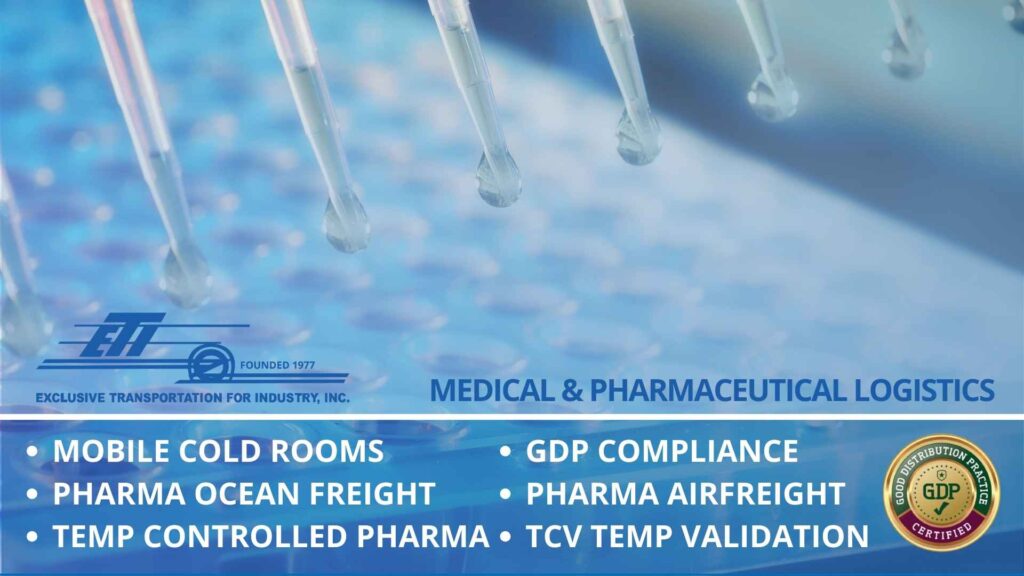Cold Chain Logistics
Reliable Temperature-Controlled Transportation for Pharmaceuticals and Life Sciences
ETI is committed to providing superior cold chain logistics solutions for pharmaceutical companies and cold storage warehouses across Pennsylvania, New York, and New Jersey. With a growing demand for temperature-controlled logistics, ETI has expanded its fleet by incorporating multiple trailers and refrigerated straight trucks equipped with advanced monitoring systems to ensure the safe transportation of temperature-sensitive shipments.
The Importance of Cold Chain Logistics in Pharmaceuticals and Life Sciences
Cold chain logistics is a critical component of pharmaceutical and life sciences supply chains, ensuring that products remain within strict temperature guidelines throughout transit. This includes the transportation of vaccines, biological samples, clinical trial materials, and temperature-sensitive medical supplies. Unlike traditional freight, cold chain logistics require specialized equipment, strict adherence to regulatory compliance, and real-time monitoring to maintain product integrity.
The cold chain logistics industry is projected to grow to $340 billion by 2025, driven by increasing demand for pharmaceutical cold chain logistics and advancements in temperature-controlled transportation technology. With pharmaceutical regulations tightening across the United States, the need for specialized logistics providers is greater than ever.
ETI’s Cold Chain Logistics Capabilities
ETI specializes in pharmaceutical cold chain logistics, ensuring that sensitive shipments reach their destinations while maintaining strict temperature requirements. Our services include:
- Refrigerated trailers and temperature-controlled straight trucks designed for life sciences cold chain logistics.
- Real-time cold chain monitoring systems to track temperature fluctuations and ensure compliance.
- Cold chain for biological samples and clinical trials, maintaining integrity throughout transit.
- Regulatory-compliant cold chain logistics solutions, adhering to FDA and GDP guidelines.
- Customized solutions for pharmaceutical and medical supply chains, ensuring timely and secure deliveries.
- Advanced route planning and logistics technology, optimizing transportation efficiency and reducing delays.
- Specialized handling procedures for high-value shipments, ensuring security and compliance throughout transit.

Pharmaceutical Cold Chain Logistics in Pennsylvania, New York, and New Jersey
As a trusted provider of cold chain logistics solutions, ETI serves clients across Pennsylvania, New York, and New Jersey, ensuring that pharmaceutical and life sciences companies have access to reliable, temperature-controlled transportation. Our strategically located hubs allow us to provide time-sensitive cold chain transportation across the Northeast United States.
Challenges in Cold Chain Logistics Management
Managing a temperature-controlled supply chain presents unique challenges, including:
- Maintaining Cold Chain Integrity During Shipping – Even slight temperature fluctuations can compromise pharmaceutical products.
- Compliance with Cold Chain Regulations – Regulations require strict monitoring and documentation to ensure safety.
- Cold Chain Risk Management – Developing contingency plans for potential temperature excursions.
- Cost Optimization in Cold Chain Logistics – Balancing refrigerated transportation costs while maintaining product quality.
- Cold Chain Packaging Innovations – Using cutting-edge packaging to maintain temperature control during transit.
- Addressing Environmental and Sustainability Concerns – Implementing eco-friendly solutions while maintaining efficiency.
- Advancing Predictive Analytics for Supply Chain Optimization – Utilizing data-driven insights to anticipate logistical challenges.
- Ensuring Continuous Training for Cold Chain Handlers – Keeping personnel updated on best practices and regulatory changes.
Innovations in Temperature-Controlled Logistics Solutions
ETI invests in state-of-the-art technology to enhance our cold chain logistics solutions, including:
- Cold chain monitoring systems for real-time temperature tracking.
- Advanced refrigerated trailers with multiple temperature zones.
- Pharmaceutical-grade temperature-controlled packaging solutions.
- Customized cold chain solutions for biopharmaceutical companies and clinical trial organizations.
- Integration of IoT and AI-driven predictive maintenance for refrigerated vehicles.
- Blockchain-enabled tracking systems for enhanced transparency and security.
- Automated warehouse solutions to streamline cold storage logistics.

Cold Chain Logistics for Vaccine Distribution
The demand for cold chain logistics for vaccines has increased significantly, particularly after the COVID-19 pandemic. Vaccine cold chain logistics require precise temperature control, often ranging between -80°C and 8°C, depending on the product. ETI ensures strict adherence to cold chain compliance regulations to safeguard the efficacy of vaccines and other sensitive pharmaceuticals.
Compliance with Cold Chain Logistics Regulations
ETI follows all FDA, GDP, and international pharmaceutical regulations, ensuring that shipments meet the highest standards for safety and quality. Our team is trained in best practices in cold chain logistics management, mitigating risks associated with temperature-sensitive shipments.
Why Choose ETI for Cold Chain Logistics?
Expertise in Life Sciences and Pharmaceutical Cold Chain Logistics
- Extensive experience in temperature-controlled logistics for pharmaceuticals and life sciences.
- Investment in cutting-edge refrigerated transportation technology.
- Commitment to regulatory compliance and quality assurance.
- Service coverage across Pennsylvania, New York, and New Jersey.
- A dedicated team of cold chain logistics specialists, ensuring every shipment is handled with precision.
Regulations and Good Distribution Practices
- Learn more about Good Distribution Practices (GDP) for Pharmaceuticals.
- Stay informed about Cold Chain Logistics Regulations by the FDA.
Related Services
- Expedited Hot Shot Trucking Services – Fast and secure deliveries for urgent pharmaceutical shipments.
- Specialized Life Science Freight Solutions – Custom logistics solutions for research and development.
- Temperature-Controlled Warehousing – Secure storage solutions for temperature-sensitive products.
 Frequently Asked Questions (FAQs) About Cold Chain Logistics
Frequently Asked Questions (FAQs) About Cold Chain Logistics
What is cold chain logistics, and why is it important?
Cold chain logistics refers to the specialized transportation and storage of temperature-sensitive products, ensuring they remain within specific temperature ranges to preserve their quality and effectiveness. This is critical in industries such as pharmaceuticals, biotechnology, and life sciences, where even slight temperature fluctuations can render products ineffective or unsafe for use.
For instance, vaccines require storage between -80°C and 8°C, while biopharmaceuticals often have strict humidity and temperature control needs. Cold chain logistics ensures compliance with regulations, prevents financial losses, and safeguards public health by maintaining product integrity throughout the supply chain.
What industries require cold chain?
Cold chain logistics is crucial for industries that handle temperature-sensitive goods. These industries include:
- Pharmaceuticals & Life Sciences – Vaccines, insulin, blood samples, and gene therapies require strict temperature-controlled transportation.
- Biotechnology & Clinical Trials – Research materials, DNA samples, and experimental drugs must be protected from temperature deviations.
- Medical Equipment & Supplies – Certain diagnostic tools and temperature-sensitive medical devices need controlled storage and shipment conditions.
- Cosmetics & Personal Care – Certain skincare and beauty products contain active ingredients that degrade in extreme temperatures.
- Chemical & Specialty Materials – Temperature-sensitive chemical compounds used in research and development must be kept at precise conditions.
How does cold chain transportation work?
Cold chain transportation involves specialized vehicles, packaging, and monitoring systems that ensure products stay within designated temperature ranges during transit. The process includes:
- Pre-Conditioning & Packaging:
- Products are placed in insulated containers or refrigerated trucks.
- Temperature-sensitive materials may be packed with phase change materials (PCMs) or dry ice.
- Real-Time Monitoring:
- IoT-enabled sensors track temperature, humidity, and location.
- Alerts are triggered if temperature excursions occur.
- Secure Handling & Delivery:
- Strict handling protocols prevent contamination or temperature fluctuations.
- Shipments follow compliance guidelines (e.g., GDP, FDA, and WHO standards).
- Final Verification:
- On arrival, products undergo temperature checks and quality assurance testing to ensure integrity and compliance
What are the biggest challenges in cold chain shipments?
Cold chain shipping faces several unique challenges, including:
- Temperature Fluctuations: Even small variations can compromise product efficacy, leading to financial losses.
- Regulatory Compliance: Adhering to standards like Good Distribution Practices (GDP) and FDA guidelines requires meticulous documentation and monitoring.
- High Operating Costs: Cold chain logistics requires specialized trucks, warehouses, and tracking systems, increasing costs.
- Infrastructure Limitations: Some regions lack adequate cold storage and refrigerated transportation, making logistics difficult.
- Supply Chain Disruptions: Delays due to weather conditions, customs clearance, or mechanical failures can impact product viability.
- Sustainability Concerns: Traditional refrigeration methods consume high energy, leading to environmental impact concerns.
What are the regulatory requirements for pharmaceutical cold chain logistics?
Regulatory bodies enforce strict guidelines to ensure the safe transportation of pharmaceutical products. Key regulations include:
- FDA (U.S. Food & Drug Administration): Ensures pharmaceutical cold chain logistics comply with CGMP (Current Good Manufacturing Practices).
- GDP (Good Distribution Practices): Defines proper storage, handling, and transportation for pharmaceuticals.
- USP <1079> (United States Pharmacopeia): Sets temperature control and monitoring standards for medical shipments.
- WHO Guidelines: Covers global cold chain logistics compliance for vaccines and biological products.
Adhering to these regulations is essential for legal compliance, product safety, and supply chain integrity.
How does real-time temperature monitoring improve cold chain logistics?
Real-time temperature monitoring is a game changer in cold chain logistics. It provides:
- Immediate Alerts: Sensors detect temperature deviations, triggering instant notifications to logistics teams.
- Location Tracking: GPS-enabled monitoring ensures shipments are on schedule and within temperature parameters.
- Data Logging & Compliance Reports: Records all transit conditions for audits and regulatory compliance.
- Preventative Action: Early warning systems allow operators to intervene before damage occurs, preventing product losses.
With advanced IoT and AI-driven analytics, companies can optimize routes, predict equipment failures, and enhance overall efficiency.
How does ETI handle pharmaceutical cold chain logistics?
ETI specializes in temperature-controlled transportation for pharmaceuticals, life sciences, and biotech industries across Pennsylvania, New York, and New Jersey. Our approach includes:
- Fleet of Refrigerated Trucks & Trailers: Ensuring constant temperature control from pickup to delivery.
- Cold Chain Monitoring Systems: Providing real-time tracking and automated alerts for potential temperature excursions.
- Regulatory Compliance Management: Ensuring all FDA, GDP, and USP requirements are met.
- Custom Logistics Solutions: Offering tailored transportation plans for clinical trials, vaccine distribution, and biological sample shipping.
By investing in the latest cold chain innovations, ETI ensures safe, compliant, and cost-effective pharmaceutical logistics.
What are the best practices for maintaining cold chain integrity?
Ensuring cold chain integrity requires strict adherence to best practices, including:
- Pre-Planning & Packaging:
- Use validated packaging materials such as vacuum-insulated panels and PCMs.
- Ensure shipments are packed with enough coolant (dry ice, gel packs, etc.).
- Temperature Monitoring:
- Utilize IoT sensors for real-time monitoring.
- Set up automated alerts for deviations.
- Strict Handling Protocols:
- Train staff in GDP-compliant procedures.
- Minimize door openings in refrigerated trailers.
- Regulatory Documentation:
- Maintain proper temperature logs.
- Ensure regulatory audit readiness with complete tracking reports.
- Contingency Planning:
- Prepare for emergency temperature fluctuations.
- Establish backup storage solutions in case of delays.
What role does cold chain logistics play in vaccine distribution?
Cold chain logistics is vital for vaccine distribution because many vaccines require strict temperature control to remain effective. For example:
- mRNA COVID-19 Vaccines (Pfizer & Moderna): Require storage at -80°C to -60°C.
- Flu Vaccines & Routine Immunizations: Require temperatures between 2°C and 8°C.
The process involves:
- Temperature-Controlled Warehousing: Ensuring storage before distribution.
- Specialized Packaging & Refrigerated Transport: Maintaining consistent cold chain conditions.
- End-to-End Tracking: Using real-time monitoring to ensure compliance.
Without proper cold chain management, vaccines can become ineffective, leading to waste and public health risks.
How can companies optimize costs in cold chain logistics?
Optimizing costs without compromising cold chain integrity requires strategic planning:
- Route Optimization: Using AI-based logistics software to find the fastest and most efficient routes.
- Energy-Efficient Refrigeration: Investing in sustainable cooling solutions to reduce costs.
- Automation & Predictive Maintenance: Preventing equipment failures that could result in expensive losses.
- Collaborative Supply Chain Models: Sharing cold storage with other businesses to minimize overhead.
- Using Smart Packaging: Minimizing waste and extending temperature stability with advanced materials.
Companies that invest in modern cold chain innovations can reduce costs while improving efficiency and compliance.


